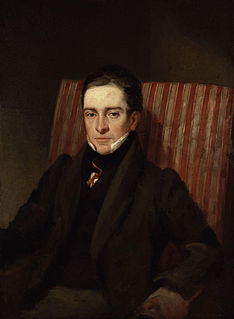A Quote by William Shakespeare
Tis safter to be that which we destroy Than by destruction dwell in doubtful joy.
Related Quotes
There could be joy in destruction, too, couldn't there? Isn't Jesus Christ's Second Coming supposed to occur only after a lot of unmitigated destruction? But again, human history is fraught with tragedies in which man spared no effort to destroy with millenarian joy, only to learn that no messiah appeared afterwards.
The 'public' is a phantom, the phantom of an opinion supposed to exist in a vast number of persons who have no effective interrelation and though the opinion is not effectively present in the units. Such an opinion is spoken of as 'public opinion,' a fiction which is appealed to by individuals and by groups as supporting their special views. It is impalpable, illusory, transient; "'tis here, 'tis there, 'tis gone"; a nullity which can nevertheless for a moment endow the multitude with power to uplift or destroy.
Destruction is always an attractive idea. My brother and I used to spend weeks making models of cities so that we could destroy them in 15 minutes. There's a fantastic joy in destroying something that you've meticulously built. Then you're free to build a new thing. Destruction and creation they're inseparable.
Destruction is always an attractive idea. My brother and I used to spend weeks making models of cities so that we could destroy them in 15 minutes. There's a fantastic joy in destroying something that you've meticulously built. Then you're free to build a new thing. Destruction and creation... they're inseparable.
Sometimes grief is a comfort we grant ourselves because it's less terrifying than trying for joy. Nobody wants to admit it. We'd all declare we want to be happy, if we could. So why, then, is pain the one thing we most often hold on to? Why are slights and griefs the memories on which we choose to dwell? Is it because joy doesn't last but grief does?
It was strange, how easily and quickly protection could cause destruction. Sometimes, Vasher wondered if the two weren't really the same thing. Protect a flower, destroy pests who wanted to feed on it. Protect a building, destroy the plants that could have grown in the soil. Protect a man. Live with the destruction he creates.
There is no beautifier of complexion, or form, or behavior, like the wish to scatter joy and not pain around us. 'Tis good to give a stranger a meal, or a night's lodging. 'Tis better to be hospitable to his good meaning and thought, and give courage to a companion. We must be as courteous to a man as we are to a picture, which we are willing to give the advantage of a good light.
The Holy Spirit gives us joy. And he is joy. Joy is the gift in which all the other gifts are included. It is the expression of happiness, of being in harmony with ourselves, that which can only come from being in harmony with God and with his creation. It belongs to the nature of joy to be radiant; it must communicate itself. The missionary spirit of the Church is none other than the impulse to communicate the joy which has been given.
The aim of torture is to destroy a person as a human being, to destroy their identity and soul. It is more evil than murder... Today we know that survivors of torture can be helped to regain their health and strength, and in helping them we take the weapon from their torturers. They sought the destruction of other human beings. We have proved that they have not succeeded.
Happiness is a state of non-contradictory joy--a joy without penalty or guilt, a joy that does not clash with any of your values and does not work for your own destruction, not the joy of escaping from your mind, but of using your mind's fullest power, not the joy of faking reality, but of achieving values that are real, not the joy of a drunkard, but of a producer.





































